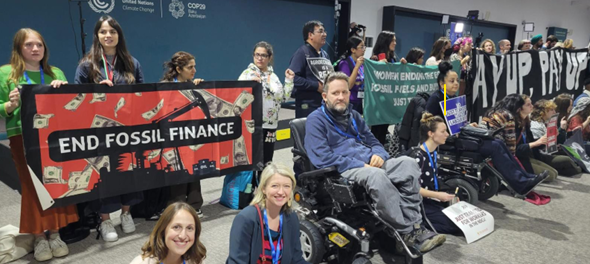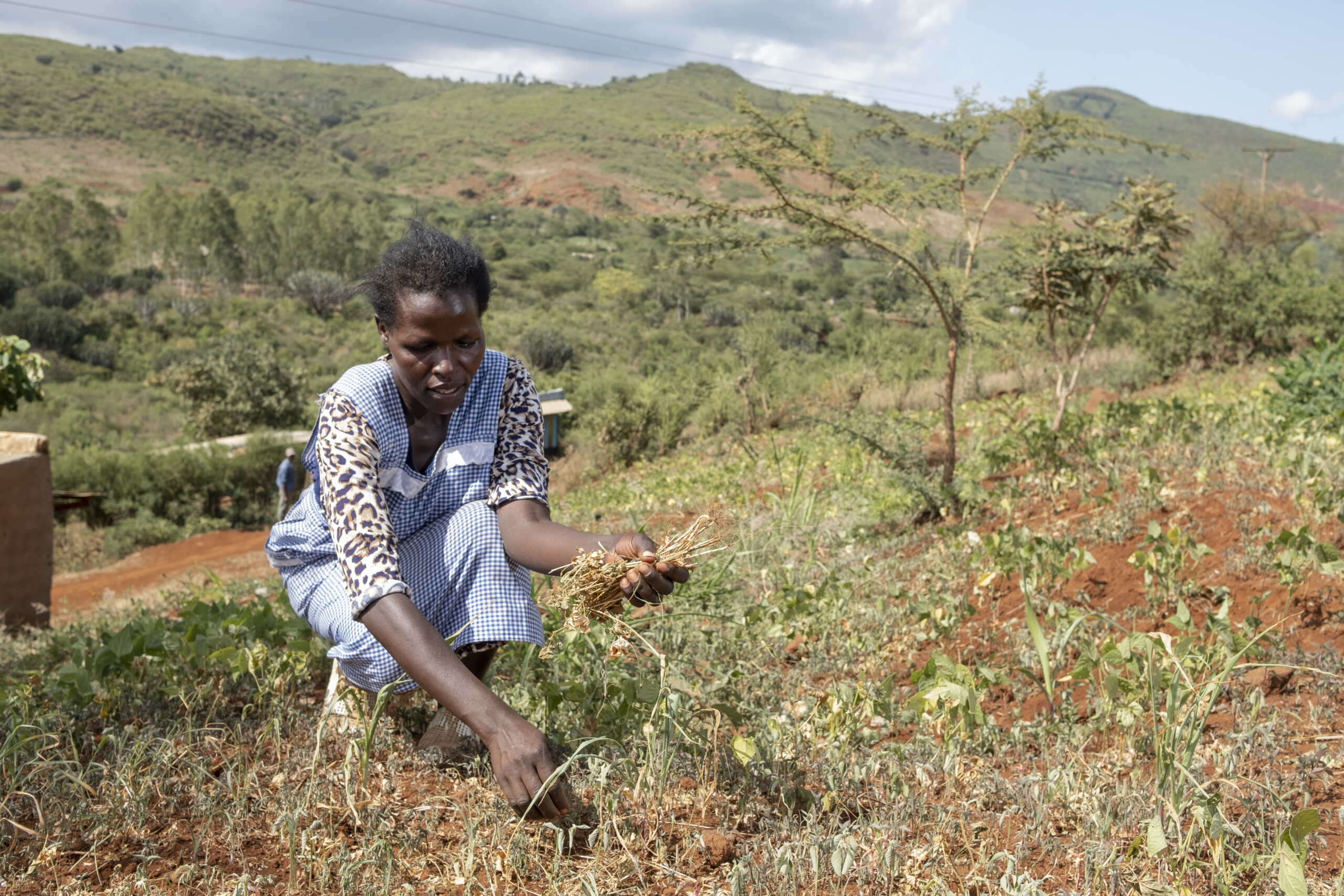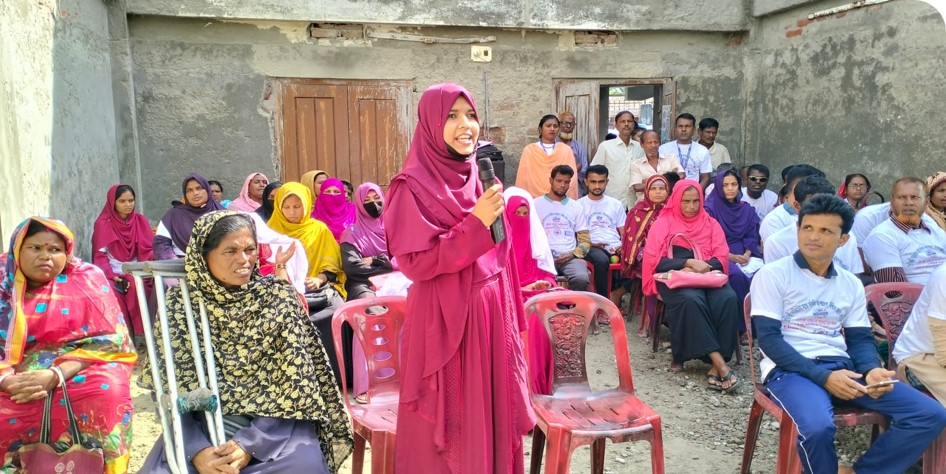Situations of risk and humanitarian emergencies
Statement from CBM Global during meeting of Joint Committee on Disability Matters, Houses of the Oireachtas, Ireland, on Thursday, 28 April 2022.
I would first like to extend thanks to the Disability Matters committee for an invite to speak to the committee today on the important topics of persons with disabilities and situations of risk and humanitarian situations. I work as Advocacy Director with CBM Global Disability Inclusion, an INGO/federation that works alongside people with disabilities in the world’s poorest places to transform lives and build inclusive communities where everyone can enjoy their human rights and achieve their full potential. Our federation members include CBM Ireland who are active members of the Dóchas Working Groups on Disability and International Development and Humanitarian Action.
At the heart of how we work in CBM Global/Ireland is in partnership with the disability movement, we work with and support organisations of people with disabilities in our programmes, to ensure we meet the needs of, and are accountable to, the individuals and communities we serve. We are pleased also to be here today, as a member of the European Disability Forum and the International Disability and Development Consortium.
Before covering the topic we are here to discuss today – Article 11 of the Convention on the Rights of Persons with Disabilities which obligates State parties to ensure the protection and safety of persons with disabilities in situations of risk, including situations of armed conflict, humanitarian emergencies and the occurrence of natural disasters – I think it’s important to acknowledge that while humanitarian disasters have been occurring year on year, that the past three years in particular have witnessed a period in time where we have seen the lives of persons with disabilities, in the most precarious of situations stemming from global pandemic, climate events and conflict.
The areas outlined for protection under Article 11, are illustrated by
- The COVID19 pandemic which caused the unnecessary deaths of many persons with disabilities worldwide;
- extreme weather events as illustrated by floods in Germany in 2021, the heat dome in Canada and on-going food security crisis in countries such as Madagascar, where the impact of climate change has impacted negatively on millions of people, including persons with disabilities and
- the dire situation of persons with disabilities currently living in Ukraine and the urgency of an inclusive humanitarian response, including safe evacuations and an inclusive response to the refugees arriving into our countries.
These are three current examples, we also know that persons with disabilities are impacted daily by conflict, crisis and climate in other parts of the world, such as Syria, Yemen. The urgency for the full implementation of Article 11 of the CRPD will always be with as emergency and disaster situations have done so, and continue to unfold at a rapid pace.
For today’s intervention, I would like to look a bit more closely at the role of the different actors that can be involved in implementing Article 11. The drafters of the CRPD asserted that that the main responsibility for Article 11’s implementation lies with the governments who ratify it and this is correct, as it is with all other international laws. But they also foresaw an important role for organisations of persons with disabilities and wider civil society to support inclusive humanitarian response. With that in mind, while focusing on the role of the Irish government, I will also highlight the importance of organisations of persons with disabilities and their critical role in supporting humanitarian responses and also the role mainstream organisations can play.
Firstly, the role of the Irish government:
The Irish government has a dual role with the implementation of Article 11, it must consider the safety of persons with disabilities in Ireland during times of risk, disaster and conflict. While it is natural for us to think of Article 11 being an article that is focused more internationally on countries that we see in the news daily, by ratifying the CRPD, the Irish government has committed to implement it for people living in Ireland.
It is interesting to see how this this detailed in Ireland’s initial State report to the Committee on the Rights of Persons with Disabilities (published in November 2021,). Under its reporting of Article 11, it details the domestic actors involved in emergency response planning and also the role of Ireland’s Broadcasting Authority in ensuring accessible communications. The report also outlines in broad terms the Irish government’s response to COVID19 pandemic. The initial report was written during the pandemic so does not offer a reflection of the effectiveness of the response.
In addition, to Ireland’s own domestic responsibilities, under the CRPD, it has responsibility for international cooperation (aid) under Article 32, which calls for disability-inclusive international cooperation. Broadly speaking this sets up an important role for the Irish government to ensure that funding channelled through international or development cooperation modalities for the purposes of humanitarian response is inclusive of persons with disabilities. The Dóchas Working Group on Disability and International Development has for many years been focused on influencing in this respect.
Recommendation to the committee: Organise learning and exchange on responding to situations of risk and humanitarian emergencies between domestic stakeholders and international stakeholders. This could be an exchange between governmental and non-governmental organisations (domestic and international), organisations of persons with disabilities to exchange best practice.
Secondly, the role of organisations of persons with disabilities:
The momentum for OPDs having a role in humanitarian response has been growing over recent years. Typically in times of risk, disaster or conflict, persons with disabilities can be viewed as a passive recipients of assistance, when they can access it. The view of persons with disabilities as powerless in these situations is widely held and perpetuated by media and imagery that we see on a daily basis. However this is not a true picture, in many situations, persons with disabilities and their representative organisations are active contributors to response during times of emergencies and time of risk. Examples of this can be found within the field of disaster risk reduction (DRR), where persons with disabilities have become active members of local DRR committees. This is also similar for climate action, where persons with disabilities and their representative organisations are engaging with the impact of the climate change in their communities. For example, a CBM Global Madagascar partner organisation representing persons with disabilities in Madagascar is mapping out where persons with disabilities are, and the challenges they face in accessing humanitarian response. Lastly, as we are sharing the panel with our colleagues the European Disability Forum, we would also like to highlight the work of EDF and their members during time of risk and crisis, in particular the toolkit they have produced on the inclusion of refugees with disabilities, and also they work they are doing in the response to Ukraine humanitarian response.
All of these examples are what the CRPD drafters had in mind, having organisations with persons with disabilities leading being active contributors. The last example to highlight more at a global level, is the Disability Reference Group, which includes a workstream on building capacity of persons with disabilities and their organisations to be part of the humanitarian sector, including leading the influencing for the change that is needed.
Recommendation for the committee: Consider an exchange with Irish organisations of persons with disabilities and Irish emergency responders to share and chart a path forward for inclusive response.
Third and finally, the role of mainstream organisations and OPDs working together in humanitarian response.
International non-governmental organisations, national governmental organisations and organisations of persons with disabilities working together have an important role to play. We are slowly beginning to see a realisation that in times of risk and emergencies, there needs to be a collective approach so that more people who are impacted by conflict and crisis can be reached. Two examples worth highlighting here to show where progress has been made include:
- The launch of IASC guidelines on 3 June 2021 by the Dóchas Humanitarian Action Working Group and the IASC Disability Reference Group on the inclusions of persons with disabilities in humanitarian action. The IASC guidelines are the first humanitarian guidelines to be developed with and by persons with disabilities and their representative organisations together with traditional aid agencies. The launch marks the beginning of a new phase of Irish action to promote uptake, and implementation of the guidelines. A commitment coming from this was a stronger focus on disability across all programming, and funding for partners and others working specifically for persons with disabilities.
- Lastly, The VIVIDT consortium funded by EU Aid Volunteers, focused on improving inclusion in volunteer management and humanitarian action. CBM Ireland led the project’s consortium and worked closely with six organisations; CBM Global, Abilis Foundation, European Disability Forum, Tearfund Ireland, Viatores Christi and ASPEm. Through close collaboration, the project built a community of practice between organisations in the consortium, sharing expertise internally and with the public.
We feel that both of these examples of working together highlight how in the future, working in consortiums bringing different levels of experience and expertise is how we can make progress on ensuring that the rights of persons with disabilities under Article 11 are implemented.
I’d like to thank you for your time.
Dr. Mary Keogh, Advocacy Director, CBM Global
E-mail: Mary.Keogh@cbm-global.org
Additional references:
Further information on CBM Global Humanitarian Mandate
https://cbm-global.org/news/situations-of-risk-and-humanitarian-emergencies
Related News

One in Five Is Not Enough: The gains on Disability Inclusion have not gone far enough
One in Five Is Not Enough: The gains on...

COP30 Is a Turning Point for Disability-Inclusive Climate Action
As the world gathers in Belém, Brazil, from 10–21 November 2025 for COP30, the message from...

Achieving resilience for all requires funding disability inclusion in DRR
On International Day for Disaster Risk Reduction (DRR) 2025,...
